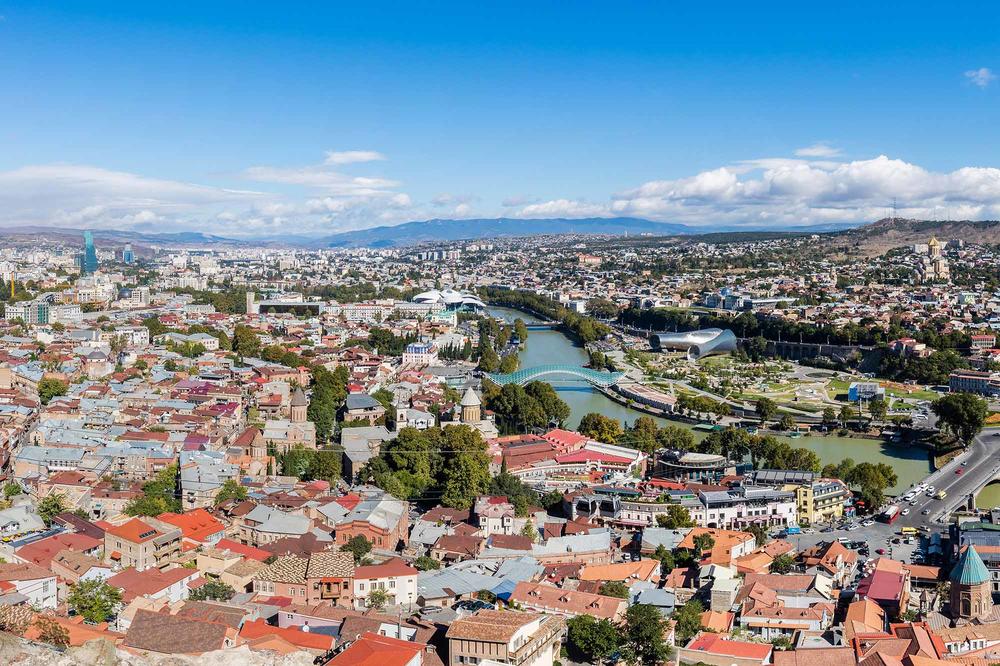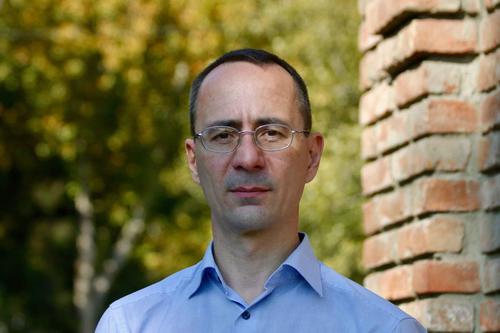From Moscow to Tbilisi
Freie Universität Berlin’s Liaison Office Eastern Europe has relocated to Georgia’s capital
Dec 19, 2022
Tbilisi, the capital city of Georgia, is home to over one million people. It is located in the eastern part of the country, at the center of the Caucasus isthmus.
Image Credit: Wikipedia / Diego Delso / creative commons CCBY-SA 4.0
Freie Universität Berlin immediately suspended relations with scientific and academic institutions in Russia following the invasion of Ukraine. The liaison office in Moscow, which had been in operation since 2010, was closed mere days after the outbreak of the war. It has since been reopened – albeit in the Georgian capital of Tbilisi. We talked to Tobias Stüdemann, long-term director of the liaison office, about the end of an era in Russia and new beginnings in the Caucasus and beyond.
When did you first decide to leave Russia?
The university management made the decision to close the office in Moscow at the beginning of March. The fact that all formalized partnerships in Russia were suspended meant that the majority of my work had simply dried up. In a way, it was a pragmatic decision: why should Freie Universität Berlin keep an office in Moscow open when there was hardly anything to do? The last straw was when the rectors of the Russian universities signed a letter of support for the Russian invasion and then insisted behind closed doors that universities “should stay out of politics” and continue on as if nothing had ever happened – that was really when we lost confidence in them. Well before February 24 I had been watching how Russia was increasingly becoming an autocratic state. This trend had been salient for a long time prior to the war, with the crackdown on the press, suppression of political opposition, and squeezing out of critical voices at the universities.
Why did you end up choosing Georgia?
A lot of factors spoke in favor of Georgia; in particular the large number of existing and future projects we have with Georgian partners, the visa exemption for neighboring states, its location at the heart of the region, and last, but not least, the low legal barriers to setting up the office there. In Tbilisi I can speak more freely than in Russia, where I could never be too sure who was listening in. Other contenders were Ukraine and even Kazakhstan. But Ukraine is too unstable right now because of the war, and there isn’t much academic interest in Kazakhstan at the moment. The Executive Board’s decision was well-justified, and as far as I can tell it’s been positively received all round because Freie Universität Berlin will continue to be represented in the region.
After many years in Moscow, Tobias Stüdemann is now representing Freie Universität Berlin from Tbilisi.
Image Credit: personal collection
From a purely practical perspective, was the move especially complicated given the current situation in Russia?
Anyone who’s ever moved from one country to another will know that it’s always a major challenge. It all began with the question of which vaccinations we would need for our cats to enter Georgia, and how we could get our hands on them considering that supply chains to Russia had been significantly disrupted. When I presented the choice of moving to Georgia or Berlin to my family, they all voted for Georgia – although we didn’t ask either of the cats. Because our daughter was going to have to change schools at the same time as the move abroad, we postponed our plans until the summer holidays. Our trip took us four days by car, during which we had beautiful summer weather and evening walks in Voronezh, Volgograd, and Nalchik. We took a bit of a detour near the Russian-Ukrainian border just to be on the safe side.
Was it difficult for you to leave Moscow after twelve years in the city?
My family and my work are more important to me than where I happen to live. Leaving did feel very strange, especially since we hadn’t planned to leave Russia so quickly. I had a good life in Moscow. But I couldn’t work there anymore, and the situation was growing more difficult for my wife, who is a Russian citizen. Whenever she wanted to express a political opinion she always had to think it over ten times beforehand because she was afraid of facing repercussions for it. The war in Ukraine also polarized her family into opponents and supporters of Putin. My first visit to Moscow was in 1991, and the idea that it may not be possible for me to go there for a very long time still seems surreal.
How did you feel when you finally reached Georgia? What were your first steps when you arrived?
It felt like I’d traveled back in time because I was in the same situation as I had been in Moscow in 2010 when I knew practically nobody there. So I just began by reaching out to all the German organizations – the German Academic Exchange Service, the Goethe Institute, the embassy, political foundations, the German Business Association, and contacts at the international offices of our partner universities. After that, you just kind of take it one step at a time. If you’ve already done it once, then the second time isn’t as hard. It’s strange to think about against the backdrop of the war, but it’s nice to see things open up again after going through a pandemic that lasted several years. There’s a sense here that we’re approaching a new horizon, and I’d like to make the most of that for our university.
How has Russia’s war of aggression in Ukraine changed relations between Freie Universität and research institutions in Eastern Europe and Central Asia?
The university can look back on over fifty years of cooperation with Russia – Freie Universität Berlin entered into a partnership agreement with Leningrad State University in 1968 in the midst of the student protests in West Berlin. Overall our focus tended to lie primarily on Russia, with little attention given to other countries in the region. We want to change that now. I see a great deal of potential in the South Caucasus and Central Asia. The region has often received the short end of the stick until now. Ukraine could be another area for us to focus on as soon as it is safe to travel in and out of the country again. However, we should no longer concentrate our efforts on a single country, and instead try to maintain as broad a perspective as possible: from Belarus to Mongolia, we should be following the interests of our researchers beyond national borders. Depending on what our partners onsite have to offer, this approach could provide opportunities to set up large-scale, transnational projects, for example in the South Caucasus or Central Asia. There is a great deal of interest – more than we can cater to. We are currently dealing with quite a few persistent questions: How can we best organize scientific and academic exchange to benefit both parties? How can we encourage doctoral candidates and students to come to Freie Universität Berlin? And how can we support people on site and help them overcome administrative hurdles? If you look at it from this angle, the move to Tbilisi hasn’t changed much about the work we carry out – after all, these are generally the main tasks of a liaison office, regardless of location.
How are you settling into life in Tbilisi?
Georgia’s a great country. Warm weather, good food... I’ve started learning Georgian. I can even recognize some of the letters now!
This article originally appeared in German on November 26, 2022, in the Tagesspiegel newspaper supplement published by Freie Universität Berlin.


